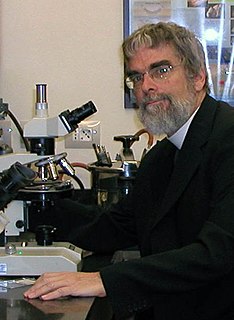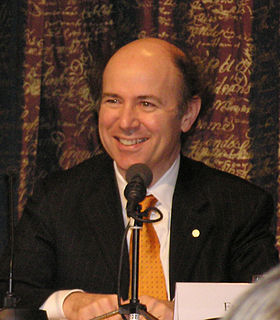A Quote by Richard Dawkins
Just because science can't in practice explain things like the love that motivates a poet to write a sonnet, that doesn't mean that religion can. It's a simple and logical fallacy to say, "If science can't do something therefore religion can.
Related Quotes
Science is like society and trade, in resting at bottom upon a basis of faith. There are some things here, too, that we can not prove, otherwise there would be nothing we can prove. Science is busy with the hither-end of things, not the thither-end. It is a mistake to contrast religion and science in this respect, and to think of religion as taking everything for granted, and science as doing only clean work, and having all the loose ends gathered up and tucked in. We never reach the roots of things in science more than in religion.
This [the opening of the Vatican City radio station built by Marconi earlier in 1931] was a new demonstration of the harmony between science and religion that each fresh conquest of science ever more luminously confirms, so that one may say that those who speak of the incompatibility of science and religion either make science say that which it never said or make religion say that which it never taught.
Science has only two things to contribute to religion: an analysis of the evolutionary, cultural, and psychological basis for believing things that aren't true, and a scientific disproof of some of faith's claims (e.g., Adam and Eve, the Great Flood). Religion has nothing to contribute to science, and science is best off staying as far away from faith as possible. The "constructive dialogue" between science and faith is, in reality, a destructive monologue, with science making all the good points, tearing down religion in the process.
Science without religion is dangerous because it necessarily entails a mechanization of humanity and consequent loss of individual autonomy and spirituality. On the other hand, religion without science is powerless because it lacks an effective means through which to actualize the ultimate reality. Science and religion must work together harmoniously.
Just to the extent that the Bible was appealed to in matters of science, science was retarded; and just to the extent that science has been appealed to in matters of religion, religion has advanced - so that now the object of intelligent religionists is to adopt a creed that will bear the test and criticism of science.
Despite all the advancements in science, and all things about religion that are disproved it still marches on. The bottom line is that the only real, absolutely provable answers about life and our place in the universe are provided by science, and religion has been holding down science since day one.
Religion needs science to keep it away from superstition and keep it close to reality, to protect it from creationism, which at the end of the day is a kind of paganism - it's turning God into a nature god. And science needs religion in order to have a conscience, to know that, just because something is possible, it may not be a good thing to do.
This much I can say with definiteness - namely, that there is no scientific basis for the denial of religion - nor is there in my judgment any excuse for a conflict between science and religion, for their fields are entirely different. Men who know very little of science and men who know very little of religion do indeed get to quarreling, and the onlookers imagine that there is a conflict between science and religion, whereas the conflict is only between two different species of ignorance.
I don't view it as mystic. I believe that God is our father. He created us. He is powerful because he knows everything. Therefore everything I learn that is true makes me more like my father in heaven. When science seems to contradict religion, then one, the other, or both are wrong, or incomplete. Truth is not incompatible with itself. When I benefit from science it's actually not correct for me to say it resulted from science and not from God. They work in concert.



































